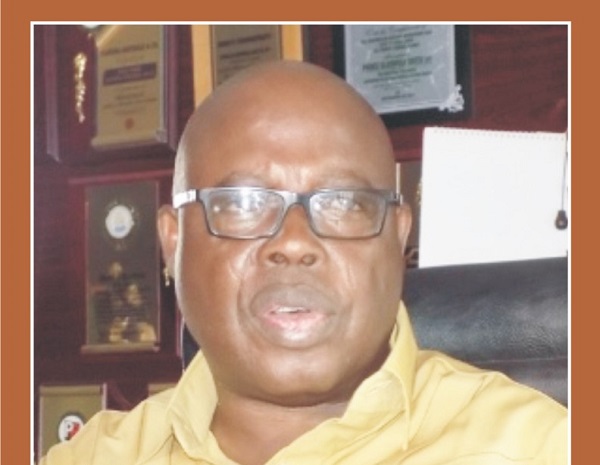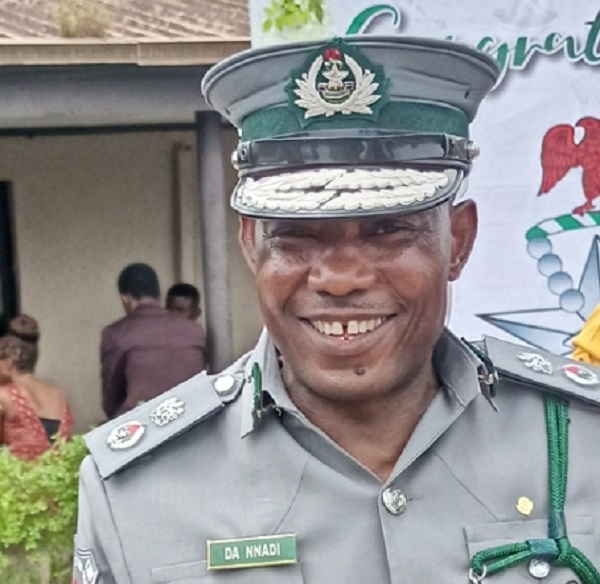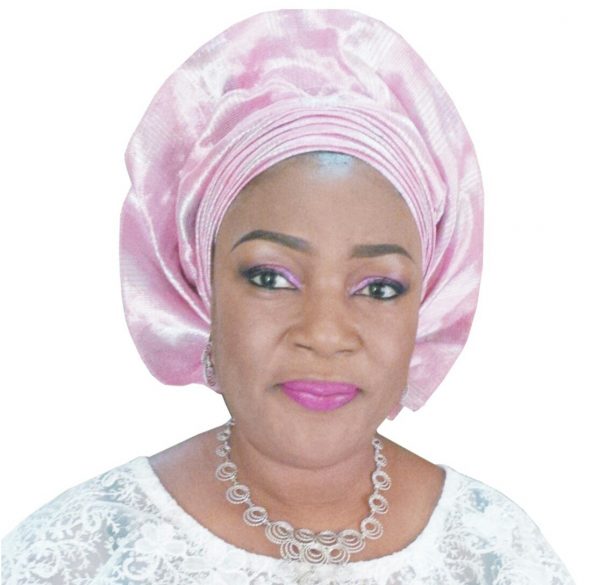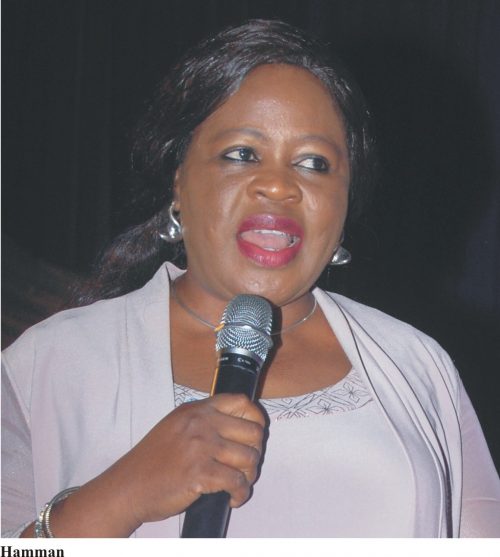Nigeria’s Maritime Industry Needs Should Drive The Laws – Edodo-Emore
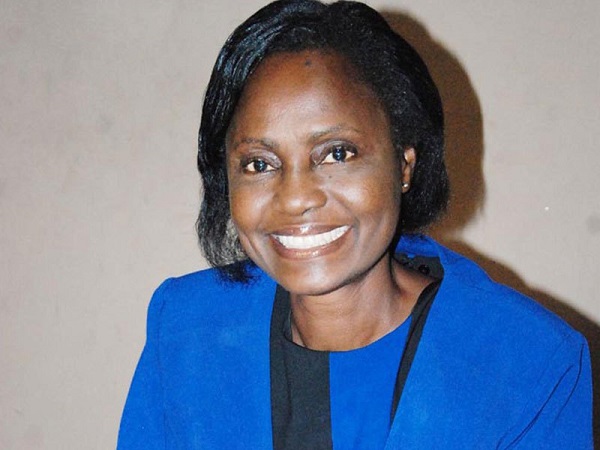
By Kenneth Jukpor
Mrs. Oritsematosan Edodo-Emore is the Principal, Zoe Maritime Resources Limited, organizers of the annual Lagos International Maritime Week. In this interview with MMS Plus, she discusses the objectives of the upcoming 2018 Lagos International Maritime Week, highlights the challenges confronting maritime development in Africa and proffers solutions. Enjoy it:
2018 Lagos International Maritime Week comes up next week. What are the objectives of this programme and what do the participants stand to benefit?
The essence of the event is to provide an opportunity for Africa discuss the issues that have hindered the development of maritime, especially Nigeria which is a nation strategically positioned as a coastal state. Is Nigeria utilizing its God-given potentials to the best? How can the nation maximize the potentials in maritime? These are some of the questions that would be answered at the conference.
Dr. Kofi Mbiah, the former Chairman, International Maritime Organization (IMO) Legal Committee, would be delivering the opening public lecture at the event on May 15th, 2018. Other notable maritime bigwigs that would deliberate issues at the conference include; the Director General, Nigerian Maritime Administration and Safety Agency (NIMASA), Dr. Dakuku Peterside, the Executive Secretary, Nigerian Shippers’ Council (NSC), Barr. Hassan Bello, Group Managing Director, Nigerian National Petroleum Corporation (NNPC), Dr. Maikanti Baru, President, Ship Owners Association of Nigeria (SOAN), Engr. Greg Ogbeifun, President, Nigerian Maritime Law Association (NMLA) Mr. Chidi Ilogu (SAN), President, Women’s International Shipping and Trading Association (WISTA) Nigeria, Mrs. Mary Hamman, among others.
The event which would take place at Oriental hotel, Victoria Island, Lagos, comprises the 3rd International Maritime Business to Business conference and exhibition from May 15th to May 17th.
We chose this theme; “Developing Maritime Infrastructure In Africa” because the resource company, Zoe Maritime Resources Limited, noticed that maritime infrastructure is a huge challenge in Africa.
Look at Lagos and the challenge we have in Apapa with the port access roads. If these challenges are addressed the nation’s economy would be taken to its zenith because efficient port systems play significant roles in developing a nation’s economy.
The event would have several roundtable discussions on Maritime Transportation, Maritime Security in the Gulf of Guinea, Maritime Law and Arbitration, Port Development, Marine Environment, Maritime Training and Education and Women in Maritime.
As part of efforts to contribute to youth enlightenment on the nature and significance of the port system in Nigeria, the event would conclude with an excursion for some students to the Lagos Deep Offshore Logistics Base (LADOL).
How would you appraise the contribution of African women to the development of the maritime sector in the continent?
I think I should start by saying that women have always played a tremendous role in the maritime industry from the beginning of history. Let’s start from the home, women as house managers always ensured that food was provided. Part of the duties of women in coastal areas has been fishing for economic gains and to put food on the table for the families. So, from the beginning of time women have always been close to the sea.
As the maritime industry continues to develop women have become more active in both the land jobs and the sea jobs. However, they have been more dominant in the land jobs than on the sea. The fact that there is a global shortage of seafarers means that there are opportunities for women in the business. My estimation is that women have always played a part and we would continue to improve. I am very optimistic of the progress women would continue to make in maritime and it is for that reason that in the 2018 Lagos International Maritime Week, one of the roundtables has been dedicated for women in maritime. This is to enable us track the development of women in the sector from the past and know where women should be in the future.
As a member of Women’s International Shipping and Trading Association (WISTA) Nigeria, what contributions has the association made to developing your career and personality?
I was the Vice-President of WISTA Nigeria when Mrs. Ify Akerele was the President. I also won an election into the international board where I represented Africa on WISTA International board. I have found WISTA to be an invaluable association as a person and also professionally as an international maritime lawyer. This is because in WISTA, the caliber of women in the association is something to write home about. It is only women in management positions that are eligible for membership of the association. That means that one is dealing with women at high levels in whatever organization they may be in. We have many women who are Managing Directors, running their companies and those working in government parastatals as the Directors, Assistant Directors, etc., so when you mix with such high caliber of people there is no doubt that it would rub off on you. That means that you are seeing and mingling with people that can inspire you. This class of people stirs you to go higher and they give you an opportunity to imitate their success. At the international level we relate with women who own tens of vessels, female ship captains, top women in the United State’s Coast Guards, among others; so it has had a tremendous impact in my life and I bless God for the opportunity to have been introduced to such a gathering and also to be able to grow in such a gathering.
Few years ago, Nigerian Shippers’ Council was almost crippled by multiple court cases against it, but as a result of the favourable judgments towards the end of 2017, we have seen a more active Council clamping down on erring shipping lines. How would you juxtapose the enactment of good laws and policies and effective administration of activities in the maritime sector?
The needs in the industry drive the laws. We need relevant laws that meet the needs of the industry and to ensure effective regulation of activities of various stakeholders in the industry. We also need to enforce the laws so that the industry can function effectively. The maritime industry is dynamic so its activities are also dynamic. Shippers Councils all over the West and Central Africa were formed as a result of the UNCTAD Code of Conduct for Liner Conferences at a time in 1970s when shipping was organized at the Liner Conferences. At that time the cargo owners had no say in the business because of the monopoly of the liners. Freight charges were increasing significantly and UNCTAD had a meeting and put up a convention to monitor Liner Conferences and regulate their activities. That was when the formula “40-40-20” meaning that the 40% of the cargoes generated by an economy should be carried by that economy, another 40% by its trading partners and 20% by intermediaries to encourage developing countries to take charge of their international trade.
In order to make this more practical, the United Nations encouraged developing countries to set-up Shippers Councils and that was how they came up in Nigeria, Ghana and other countries. However, shipping is no longer organized in Liner Conferences; it has moved to containerization, multimodal and the dynamics have changed. Nigeria recognized that the dynamics had changed and that’s why Shippers’ Council has been given more responsibilities – the port economic regulatory role. That means the Council has to look at the economic interest of everybody at the ports. It is the Council’s responsibility to see where there is a lapse and step in to correct it. For example, if a company is charging undue demurrage, as the port economic regulator the Council has the onus to step in. If the Council wasn’t the port economic regulator, it wouldn’t be able to do that. Now we are seeing the Council take advantage of the powers it has been given and that explain why it was able to close GAC Shipping. This is also an example to other operators that it’s goodbye to business as usual. As the Council gears up to transmute into the National Transport Commission (NTC), they will be more relevant and powerful but there’s no reason for anybody to be scared because the initial reason for establishing the Council has been overtaken by events. It’s time for the Council to take newer responsibilities.
The Ease of Doing Business initiative in the country was introduced at the ports for almost a year. However, several infrastructural deficits as well as inter-agency rift rendered the strategies moribund. What’s your assessment of this Ease of Doing Business moves?
I want to commend the policy on ease of doing business. It is an acknowledgement of the fact that there is need for progress at the port. It is also an acknowledgement of the fact that the port is very crucial to the development of the nation’s economy. If ship turnaround time was small and cargo clearance was speedy probably in 24hours or 48hours, you would find that more businesses would be done in the country and there would be more imports and exports. So, recognizing that the policy was necessary is a plus, but the nation is yet to achieve the benefits of that policy. I would say that the country is at the median because we haven’t achieved all that the policy set out to achieve as a result of some problems like infrastructure deficit that was there before the policy came up.
The theme of developing the maritime infrastructure for the 2018 Lagos International Maritime Week is apt because the ease of doing business isn’t only in the port but everywhere that concerns Nigeria and the rest of the world.
This ease of doing business also includes the airports. For instance, in preparation for the 2018 Lagos International Maritime Week, we observed that obtaining visas to Nigeria has been a headache. Our delegates in Dubai and some other countries have complained that they cannot submit their passports at the embassies as they have to get an agent. Our delegates are getting frustrated and I’m asking myself, where is the ease of doing business? These are people coming to Nigeria for the first time; they read about the 2018 Lagos International Maritime Week, got interested in attending the conference but they are frustrated at the challenges at the embassy. With our clients, we have spoken gently, sent all documents required by the company to make it easier for the foreign delegates. We wish the process had been easier, however, we recognize the fact that it is a work in progress. It’s a good policy but we have to continuously push for action.
How about the problems associated with inter-agency rift?
Inter-agency rift wouldn’t smoothen suddenly because many agencies have been used to being there. Most of the agencies have carved out a jurisdiction for itself, so, you find them trying to guard their respective territories. However, if we are talking about enhancing the ease of doing business, then all agencies have to be trained to work together. There’s no other way to guarantee ease of operations than inter-agency cooperation.
Recently, Shippers’ Council issued a directive demanding all shipping lines/ agents to publish the rotation number of vessels on their websites five days before the arrival of the vessel into Nigeria. What’s your take on this development?
I think that is an excellent requirement for planning. One of the greatest difficulties of developing countries is lack of planning. If Shippers’ Council is saying send us rotation numbers of vessels five days before they arrive, they are trying to put an order into an otherwise chaotic system. It may be difficult at first but people would later become used to the new order.
Admiralty law in Nigeria has observed significant improvement in recent years as a result of frequent maritime seminar for judges. How has the practice evolved and how does Nigeria compare to developed countries?
Admiralty law in Nigeria is still a work in progress. I wouldn’t compare Nigeria with the United Kingdom that has had a history and precedents in maritime law and administration.
One of the recent developments in the maritime industry of Nigeria with regards to the law is the seminar for judges with Shippers’ Council is spearheading. For a very long time, maritime law wasn’t taught in Nigerian universities, although now it’s been taught. In the past one was faced with the challenge of judges learning on the job. With the seminar for judges, the subject is been expounded by practicing maritime lawyers.
The seminars have been on for more than a decade and the quality of judgments has continued to improve and we hope it continues to improve. However, in developed countries there are more cases that have passed through them, the practice has improved. The established maritime jurisprudence like the UK is established because they have the experience in cases that have passed through them. That’s the only way the law develops. The law develops from precedents and experience of people coming to court and the judges having an opportunity to decide on the disputes. If the disputes do not come to court, then the law is at a stand-still. So, as far as the development of maritime law in Nigeria is concerned, I think it is going well even though there is need for improvement in the administration of maritime law. At the Federal High Court, we have been talking about opening an admiralty registry to make the process of filing maritime cases easier and faster.
What’s your appraisal of the nation’s maritime sector so far in 2018?
You can see what’s happening in Apapa, the home of the nation’s biggest seaports. The road infrastructure has taken a toll on the maritime sector and that shows you why infrastructural development is very necessary. The ports may be well equipped but if the access roads aren’t there, it’s almost the same as the port not being there. This shows that every segment is interrelated. The quality of the roads and the quality of the rail have to be improved for easy access into the ports. The Apapa road has had a negative effect on the output in almost the first half of the year. We hope that by this time next year the maritime industry would have a different story as the roads would have been fixed and traffic flow in and out of Apapa would be easy. This also brings us to the place of development of the waterways and rails to ease the burden on the roads. All of the tankers carrying petroleum products from Lagos can use the rail or waterways, if such transport modes are developed.
Lastly, as a woman, what are expectations from the 2019 Nigeria general elections in terms of the opportunities for women in governance?
I can see a lot of women already jostling for senatorial positions, House of Representatives, at Local Governments, and other areas. I see more women becoming politically active and I support that. If women aren’t involved in the politics then they wouldn’t be involved at the decision making levels. If women aren’t there, men would have to make the decisions and some of the decisions may not necessarily reflect our vision. I look forward to 2019 very much because I anticipate more women involvement.



